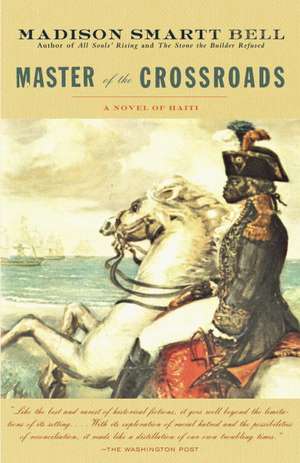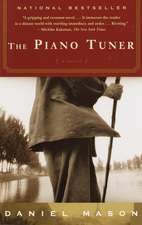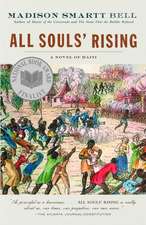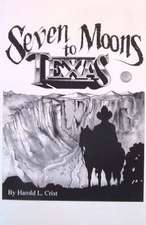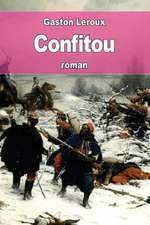Master of the Crossroads
Autor Madison Smartt Bellen Limba Engleză Paperback – 31 oct 2004
Bell’s grand, multifaceted novel shows a nation, splintered by actions and in the throes of chaos, carried to liberation and justice through the undaunted tenacity of one incredible visionary.
Preț: 136.86 lei
Nou
Puncte Express: 205
Preț estimativ în valută:
26.20€ • 28.46$ • 22.02£
26.20€ • 28.46$ • 22.02£
Carte disponibilă
Livrare economică 31 martie-14 aprilie
Preluare comenzi: 021 569.72.76
Specificații
ISBN-13: 9781400078387
ISBN-10: 1400078385
Pagini: 752
Ilustrații: 1 MAP, 1 HALFTONE
Dimensiuni: 134 x 205 x 34 mm
Greutate: 0.56 kg
Ediția:First Vintage B.
Editura: Vintage Publishing
ISBN-10: 1400078385
Pagini: 752
Ilustrații: 1 MAP, 1 HALFTONE
Dimensiuni: 134 x 205 x 34 mm
Greutate: 0.56 kg
Ediția:First Vintage B.
Editura: Vintage Publishing
Notă biografică
Madison Smartt Bell is the author of fourteen works of fiction, including The Stone That the Builder Refused; All Souls’ Rising; Save Me, Joe Louis; Dr. Sleep; Soldier's Joy; and Ten Indians. He lives in Baltimore, Maryland with his family and teaches at Goucher College.
Extras
Fort de Joux, France
August 1802
Citizen Baille, commandant of the Fort de Joux, crossed the courtyard of the mountain fortress, climbed a set of twelve steps, and knocked on the outer door of the guardhouse. When there was no reply, he hitched up the basket he carried over his left arm and rapped again more smartly with his right fist. A sentry opened to him, stood aside, and held his salute. Baille acknowledged him, then turned and locked the door with his own hand.
"Les clefs," said Baille, and the sentry presented him with a large iron keyring.
"In the future," Baille announced, "I will keep these keys in my own possession. Whoever has need of them must come to me. But there will be no need."
Citizen Baille unlocked the inner door and pulled, heaving a part of his considerable weight against the pull-ring to set the heavy door turning on its hinges. He stooped and picked up a sack of clothing from the floor, and carrying both sack and basket, passed through the doorway and turned and locked it behind him.
The vaulted corridor was dimly lit through narrow loopholes that penetrated the twelve-foot stone walls. Baille walked the length of it, aware of the echo of his footfalls. At the far end he set down the basket and the sack and unlocked another door, passed through, and relocked it after him.
Two steps down brought him to the floor of the second vaulted corridor, which was six inches deep in the water that came imperceptibly, ceasely seeping from the raw face of the wall to the left--the living stone of the mountain. Baille muttered under his breath as he traversed the vault; his trousers were bloused into his boots, which had been freshly waxed but still leaked around the seams of the uppers. Opening the next door was an awkward affair, for Baille must balance the sack and basket as he worked the key; there was no place on the flooded floor to lay them down.
Ordinarily he might have brought a soldier or a junior officer to bear those burdens for him, but the situation was not ordinary, and Baille was afraid--no (he stopped himself), he was not afraid, but . . . He could not rid his mind of the two officers of the Vendée who had lately escaped from this place. It was an embarrassment, a scandal, a disgrace, and Baille might well have lost his command, he thought, except that to be relieved of this miserable, frozen, isolated post might almost have been taken as a reward rather than a punishment. He still had little notion how the escape had been possible. There was none among his officers or men whom he distrusted, and yet none could give a satisfactory explanation of what had taken place. The prisoners could not have slipped through the keyholes or melted into the massive stone walls, and the heavy mesh which covered the cell windows (beyond their bars) was not wide enough to pass a grown man's finger.
His current prisoner was vastly more important than those officers could ever dream to be--although he was a Negro, and a slave. From halfway around the world Captain-General Leclerc had written to his brother-in-law, the First Consul, Napoleon Bonaparte himself, that this man had so inflamed the rebel slaves of Saint Domingue that the merest hint of his return there would overthrow all the progress Leclerc and his army had made toward the suppression of the revolt and the restoration of slavery. Perhaps only the whisper of the name of Baille's prisoner on the lips of the blacks of Saint Domingue would be sufficient cause for that Jewel of the Antilles, so recently France's richest possession overseas, to be purged yet another time with fire and blood. So wrote the Captain-General to his brother-in-law, and it seemed that the First Consul himself took the liveliest interest in the situation, reinforcing with his direct order Leclerc's nervous request that the prisoner be kept in the straitest possible security, and as far away as possible from any seaport that might provide a route for his return.
The Fort de Joux, perched high in the Alps near the Swiss border, met this second condition most exactly. One could hardly go farther from the sea while still remaining within French borders. As for security, well, the walls were thick and the doors heavy, the windows almost hermetically sealed. In the case of the recent escape there had most certainly been betrayal. The officers had somehow obtained the files they used to cut their bars, and probably had enjoyed other aid from some unknown person in the fort. For this reason Baille had chosen to wait upon his new prisoner himself and alone, at least for the present, despite the inconvenience it occasioned.
While pursuing this uneasy rumination, he had crossed the third corridor, which was set at a higher level than the one before and therefore was less damp. He opened and relocked the final door and turned to face the openings of two cells. Clearing his throat, he walked to the second door and called out to announce himself. After a moment a voice returned the call, but it was low and indistinct through the iron-bound door.
Baille turned the key in the lock and went in. The cell, vaulted like the passages leading to it, was illuminated only by coals of the small fire. Baille's heart quivered like a jelly, for it seemed there was no one in the room--he saw with his frantically darting eyes the low bed, stool, the table . . . but no human being. He dropped the sack and clapped a hand over his mouth. But now the man was standing before him after all, not five paces distant, as if he had been dropped from the ceiling--or had spun himself down, like a spider on its silk. Indeed the barrel vault overhead was filled with dismal shadows, so that Baille could not make out the height of its curve. The vault dwarfed the prisoner, a small Negro unremarkable at first glance, except that he was slightly bandy-legged. Baille swallowed; his tongue was thick.
"Let us light the candle," he said. When there was no response he went to the table and did so himself, then turned to inspect the prisoner in the improved light.
This was Toussaint Louverture, who had thought to make the island colony of Saint Domingue independent of France. He had written and proclaimed a constitution; he had, so rumor ran, written to the First Consul with this arrogant address: "To the first of the whites from the first of the blacks." But now, if this arrogance had not been exactly punished, it had certainly been checked by many rings of stone.
Baille faced his guest with a smile, feeling his lips curve on his face like clay. "I have brought your rations," he said.
Toussaint did not even glance at the basket, which Baille had set down on the table when he struck the light. He looked at the commandant with a cool intensity which Baille found rather unnerving, though he did his best to hold . . . after all, it was not quite a stare. Toussaint's head was disproportionately large for his body, with a long lower jaw and irregular brown teeth. His eyes, however, were clear and intelligent. He wore a madras cloth bound around his head and the uniform of a French general, which was, however, limp and soiled. Apparently he had had no change of his outer garments since he had first been made prisoner and deported from Saint Domingue.
"I have brought you fresh clothing," Baille said, and indicated the sack he had dropped on the floor in his first surprise. Toussaint did not shift his gaze to acknowledge it. Presently Baille picked up the sack himself and stooped to lay out the contents on the low bed.
"This uniform is not correct," Toussaint said.
Baille swallowed. "You must accept it." Somehow he could not manage to phrase the sentence with greater force.
Toussaint looked briefly at the coals in the fire.
"Your uniform is soiled and worn, and too light for the weather," Baille said. "It is already cold here, and soon it will be winter, sir--" This sir escaped him involuntarily. He stopped and looked at the woolen clothes he had unfolded on the bed. "Acceptez-les, je vous en prie."
Toussaint at last inclined his head. Baille sighed. "I must also ask that you surrender any money you may have, or any . . ." He let the sentence trail. He waited, but nothing else happened at all. "Do you understand me?" This time Baille suppressed the sir. "Yes, of course," Toussaint said, and he turned his head and shoulder toward the door. Baille had already begun walking in that direction before he recognized that he had been dismissed, that he should not permit himself to be so dismissed, that it was his clear duty to remain and watch the prisoner disrobe and see with his own eyes that he held nothing back. However, he soon found himself against the outside of the door, unreeling in his mind long strings of curses, although he did not know for certain if it were the prisoner or the assigned procedures he meant to curse.
After a few minutes he called out. The same indistinct mutter returned through the door, and Baille opened it and went back in. Toussaint stood in the fresh clothes that had been given him; his feet, incongruously, were bare. Or rather Baille felt that he himself would have looked absurd and foolish standing barefoot in such a situation, but it detracted in no way from the dignity of the prisoner. Toussaint motioned toward the table with a slight movement of his left hand.
From the Hardcover edition.
August 1802
Citizen Baille, commandant of the Fort de Joux, crossed the courtyard of the mountain fortress, climbed a set of twelve steps, and knocked on the outer door of the guardhouse. When there was no reply, he hitched up the basket he carried over his left arm and rapped again more smartly with his right fist. A sentry opened to him, stood aside, and held his salute. Baille acknowledged him, then turned and locked the door with his own hand.
"Les clefs," said Baille, and the sentry presented him with a large iron keyring.
"In the future," Baille announced, "I will keep these keys in my own possession. Whoever has need of them must come to me. But there will be no need."
Citizen Baille unlocked the inner door and pulled, heaving a part of his considerable weight against the pull-ring to set the heavy door turning on its hinges. He stooped and picked up a sack of clothing from the floor, and carrying both sack and basket, passed through the doorway and turned and locked it behind him.
The vaulted corridor was dimly lit through narrow loopholes that penetrated the twelve-foot stone walls. Baille walked the length of it, aware of the echo of his footfalls. At the far end he set down the basket and the sack and unlocked another door, passed through, and relocked it after him.
Two steps down brought him to the floor of the second vaulted corridor, which was six inches deep in the water that came imperceptibly, ceasely seeping from the raw face of the wall to the left--the living stone of the mountain. Baille muttered under his breath as he traversed the vault; his trousers were bloused into his boots, which had been freshly waxed but still leaked around the seams of the uppers. Opening the next door was an awkward affair, for Baille must balance the sack and basket as he worked the key; there was no place on the flooded floor to lay them down.
Ordinarily he might have brought a soldier or a junior officer to bear those burdens for him, but the situation was not ordinary, and Baille was afraid--no (he stopped himself), he was not afraid, but . . . He could not rid his mind of the two officers of the Vendée who had lately escaped from this place. It was an embarrassment, a scandal, a disgrace, and Baille might well have lost his command, he thought, except that to be relieved of this miserable, frozen, isolated post might almost have been taken as a reward rather than a punishment. He still had little notion how the escape had been possible. There was none among his officers or men whom he distrusted, and yet none could give a satisfactory explanation of what had taken place. The prisoners could not have slipped through the keyholes or melted into the massive stone walls, and the heavy mesh which covered the cell windows (beyond their bars) was not wide enough to pass a grown man's finger.
His current prisoner was vastly more important than those officers could ever dream to be--although he was a Negro, and a slave. From halfway around the world Captain-General Leclerc had written to his brother-in-law, the First Consul, Napoleon Bonaparte himself, that this man had so inflamed the rebel slaves of Saint Domingue that the merest hint of his return there would overthrow all the progress Leclerc and his army had made toward the suppression of the revolt and the restoration of slavery. Perhaps only the whisper of the name of Baille's prisoner on the lips of the blacks of Saint Domingue would be sufficient cause for that Jewel of the Antilles, so recently France's richest possession overseas, to be purged yet another time with fire and blood. So wrote the Captain-General to his brother-in-law, and it seemed that the First Consul himself took the liveliest interest in the situation, reinforcing with his direct order Leclerc's nervous request that the prisoner be kept in the straitest possible security, and as far away as possible from any seaport that might provide a route for his return.
The Fort de Joux, perched high in the Alps near the Swiss border, met this second condition most exactly. One could hardly go farther from the sea while still remaining within French borders. As for security, well, the walls were thick and the doors heavy, the windows almost hermetically sealed. In the case of the recent escape there had most certainly been betrayal. The officers had somehow obtained the files they used to cut their bars, and probably had enjoyed other aid from some unknown person in the fort. For this reason Baille had chosen to wait upon his new prisoner himself and alone, at least for the present, despite the inconvenience it occasioned.
While pursuing this uneasy rumination, he had crossed the third corridor, which was set at a higher level than the one before and therefore was less damp. He opened and relocked the final door and turned to face the openings of two cells. Clearing his throat, he walked to the second door and called out to announce himself. After a moment a voice returned the call, but it was low and indistinct through the iron-bound door.
Baille turned the key in the lock and went in. The cell, vaulted like the passages leading to it, was illuminated only by coals of the small fire. Baille's heart quivered like a jelly, for it seemed there was no one in the room--he saw with his frantically darting eyes the low bed, stool, the table . . . but no human being. He dropped the sack and clapped a hand over his mouth. But now the man was standing before him after all, not five paces distant, as if he had been dropped from the ceiling--or had spun himself down, like a spider on its silk. Indeed the barrel vault overhead was filled with dismal shadows, so that Baille could not make out the height of its curve. The vault dwarfed the prisoner, a small Negro unremarkable at first glance, except that he was slightly bandy-legged. Baille swallowed; his tongue was thick.
"Let us light the candle," he said. When there was no response he went to the table and did so himself, then turned to inspect the prisoner in the improved light.
This was Toussaint Louverture, who had thought to make the island colony of Saint Domingue independent of France. He had written and proclaimed a constitution; he had, so rumor ran, written to the First Consul with this arrogant address: "To the first of the whites from the first of the blacks." But now, if this arrogance had not been exactly punished, it had certainly been checked by many rings of stone.
Baille faced his guest with a smile, feeling his lips curve on his face like clay. "I have brought your rations," he said.
Toussaint did not even glance at the basket, which Baille had set down on the table when he struck the light. He looked at the commandant with a cool intensity which Baille found rather unnerving, though he did his best to hold . . . after all, it was not quite a stare. Toussaint's head was disproportionately large for his body, with a long lower jaw and irregular brown teeth. His eyes, however, were clear and intelligent. He wore a madras cloth bound around his head and the uniform of a French general, which was, however, limp and soiled. Apparently he had had no change of his outer garments since he had first been made prisoner and deported from Saint Domingue.
"I have brought you fresh clothing," Baille said, and indicated the sack he had dropped on the floor in his first surprise. Toussaint did not shift his gaze to acknowledge it. Presently Baille picked up the sack himself and stooped to lay out the contents on the low bed.
"This uniform is not correct," Toussaint said.
Baille swallowed. "You must accept it." Somehow he could not manage to phrase the sentence with greater force.
Toussaint looked briefly at the coals in the fire.
"Your uniform is soiled and worn, and too light for the weather," Baille said. "It is already cold here, and soon it will be winter, sir--" This sir escaped him involuntarily. He stopped and looked at the woolen clothes he had unfolded on the bed. "Acceptez-les, je vous en prie."
Toussaint at last inclined his head. Baille sighed. "I must also ask that you surrender any money you may have, or any . . ." He let the sentence trail. He waited, but nothing else happened at all. "Do you understand me?" This time Baille suppressed the sir. "Yes, of course," Toussaint said, and he turned his head and shoulder toward the door. Baille had already begun walking in that direction before he recognized that he had been dismissed, that he should not permit himself to be so dismissed, that it was his clear duty to remain and watch the prisoner disrobe and see with his own eyes that he held nothing back. However, he soon found himself against the outside of the door, unreeling in his mind long strings of curses, although he did not know for certain if it were the prisoner or the assigned procedures he meant to curse.
After a few minutes he called out. The same indistinct mutter returned through the door, and Baille opened it and went back in. Toussaint stood in the fresh clothes that had been given him; his feet, incongruously, were bare. Or rather Baille felt that he himself would have looked absurd and foolish standing barefoot in such a situation, but it detracted in no way from the dignity of the prisoner. Toussaint motioned toward the table with a slight movement of his left hand.
From the Hardcover edition.
Recenzii
“Like the best and rarest of historical fictions, it goes well beyond the limitations of its setting. . . . With its exploration of racial hatred and the possibilities of reconciliation, it reads like a distillation of our own troubling times.” –The Washington Post
“A brilliant performance, the work of an accomplished novelist of peculiar energy and courage. . . . One puts down Master of the Crossroads with a visceral knowledge of what it felt like to wage war in Haiti at the turn of the nineteenth-century.” –The New York Times Book Review
“Fiction in the grandest, most ambitious form. . . . Often the prose swaggers muscularly, reminiscent of Cormac McCarthy in the Border Trilogy; at other times it grows florid and surreal, in the vein of Gabriel Garcia Marquez.” –The Boston Globe
“Bell has taught historians a thing or two about what it means to have an intimate relationship with the past. Throwing caution to the wind, he has taken up a little-known but hugely important subject with passion and conviction.” –Los Angeles Times
"A stunning achievement: marvelously crafted, meticulous in its historical detail, magnificent in its sweep." --The Seattle Times
“[A] rich novel. . . . Its huge tapestry of scenes on battlefields and plantations, in ranches and churches, vibrantly reanimates Bell’s cast of real and fictional characters. . . . [Toussaint] is now one of the great characters in modern literature.” --San Francisco Chronicle
"An absorbing and . . . majestic read. . . . [Bell] could not have chosen a more resonant setting than Haiti, nor found a more telling figure in whom to summon contemporary hopes and fears." --Chicago Tribune
"This meticulously researched novel has the feel of a tableau by Delacroix: a generous swirl of individual and collective fervor." --The New Yorker
"A fascinating tale. . . . Bell rides his near-perfect prose style through the terrain of the human psyche with astonishing ease." --The Philadelphia Inquirer
“Bell has learned well the lessons of [Tolstoy]. . . . [The] human drama of families, lovers and individual quests for self-knowledge envelops the reader in a brilliant blend of history and fiction.” --The Portland Oregonian
"Atmospheric, well-researched, and well-written. . . . The unfolding of Haitian history is a fascinating tale, and Bell tells it with great skill." --The Pittsburgh Post Gazette
“Provides a history lesson that tells us much about our present and, perhaps, constitutes a warning for our future.” --The Miami Herald
“Read this novel to get a feel of life and death in the midst of one of the New World’s major political and military uprisings . . . in this trilogy we find the talented Madison Smartt Bell at the crossroads of his career.” --The Dallas Morning News
“A brilliant performance, the work of an accomplished novelist of peculiar energy and courage. . . . One puts down Master of the Crossroads with a visceral knowledge of what it felt like to wage war in Haiti at the turn of the nineteenth-century.” –The New York Times Book Review
“Fiction in the grandest, most ambitious form. . . . Often the prose swaggers muscularly, reminiscent of Cormac McCarthy in the Border Trilogy; at other times it grows florid and surreal, in the vein of Gabriel Garcia Marquez.” –The Boston Globe
“Bell has taught historians a thing or two about what it means to have an intimate relationship with the past. Throwing caution to the wind, he has taken up a little-known but hugely important subject with passion and conviction.” –Los Angeles Times
"A stunning achievement: marvelously crafted, meticulous in its historical detail, magnificent in its sweep." --The Seattle Times
“[A] rich novel. . . . Its huge tapestry of scenes on battlefields and plantations, in ranches and churches, vibrantly reanimates Bell’s cast of real and fictional characters. . . . [Toussaint] is now one of the great characters in modern literature.” --San Francisco Chronicle
"An absorbing and . . . majestic read. . . . [Bell] could not have chosen a more resonant setting than Haiti, nor found a more telling figure in whom to summon contemporary hopes and fears." --Chicago Tribune
"This meticulously researched novel has the feel of a tableau by Delacroix: a generous swirl of individual and collective fervor." --The New Yorker
"A fascinating tale. . . . Bell rides his near-perfect prose style through the terrain of the human psyche with astonishing ease." --The Philadelphia Inquirer
“Bell has learned well the lessons of [Tolstoy]. . . . [The] human drama of families, lovers and individual quests for self-knowledge envelops the reader in a brilliant blend of history and fiction.” --The Portland Oregonian
"Atmospheric, well-researched, and well-written. . . . The unfolding of Haitian history is a fascinating tale, and Bell tells it with great skill." --The Pittsburgh Post Gazette
“Provides a history lesson that tells us much about our present and, perhaps, constitutes a warning for our future.” --The Miami Herald
“Read this novel to get a feel of life and death in the midst of one of the New World’s major political and military uprisings . . . in this trilogy we find the talented Madison Smartt Bell at the crossroads of his career.” --The Dallas Morning News
